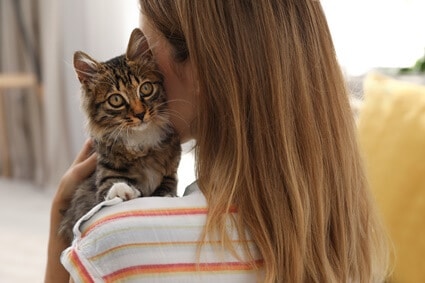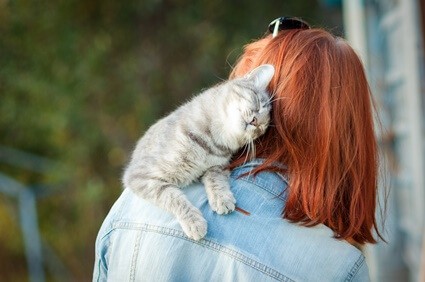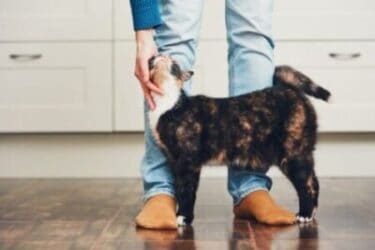Sudden changes in feline behavior always raise alarm bells. If your cat’s suddenly clingy, you may not mind at first. It’ll likely be enjoyable to be showered with affection from your cat. However, there will be a reason for this change in your cat’s personality.
Cats suddenly become more affectionate due to anxiety. Your cat may feel insecure about a new person in the home, such as a baby or partner. A loud noise may have spooked your cat, or it may be sick and feel afraid. Pregnant cats and cats in heat are clingy due to fluctuating hormones.
Some cats will be seeking attention as they know how to manipulate humans. Displaying affection can be a way to get food or a petting session. If your cat’s needy behavior continues, you’ll need to assess why.
My Cat Has Become Very Clingy
Cats have a reputation for being indifferent to their human owners, but this is just a myth. Cats forge complex bonds with humans, but they’re less likely to display this affection.
According to Behavioral Processes, cats often take behavioral cues from their owners. So, a neurotic, nervous owner will lead to a cat with a similar temperament.
You need to assess whether your cat is clingy. Some owners mistake affection from cats as neediness. However, your cat may just be demonstrating affection or gratitude.
The signs of a clingy cat include the following:
- Following you around the house.
- Sitting on your lap so you cannot move.
- Grabbing clothing and digging in claws to maintain grip.
- Constantly circling and rubbing against your legs.
- Preventing you from completing tasks, such as lying on a computer keyboard.
- Verbalizing and growing distressed when you don’t immediately respond.
- Crying, hissing, and behaving destructively when you leave the room.
The occasional meow or gentle headbutt from a cat is normal. Also, your cat will be concerned if you’ve failed to provide a meal at the usual time.
What Is a Normal Level of Feline Affection?
Some cats enjoy lavishing their owners with love, while others prefer not to show affection as they fear it’ll weaken their claim to dominance or territory.
If your cat never approaches you, this is a bad sign as it may be afraid of you. As Veterinary Clinics of North America explains, this can lead to health and behavioral problems.
A cat refusing to leave your side is equally problematic as it can get underfoot. Also, the cat may develop separation anxiety, resulting in damage to your home whenever you leave home.
A normal, happy cat will be neither clingy nor aloof, seeking attention on occasions when it wants it.
Most often, cats want attention:
- First thing in the morning
- When you return home from work
- When a scheduled playtime arrives
- When it’s due to be fed
If your cat is affectionate during these times, you have a healthy relationship.
Why is My Cat Being So Affectionate All of a Sudden?
Many people assume that clingy cats are spoiled or demanding as they received too much attention when kittens and are too used to having things their own way.
However, this is unlikely, so there’s usually an explanation for a cat suddenly becoming clingy.
Cats become overtly affectionate for the following reasons:
- Wants more attention than you are providing
- Nervous and anxious, seeking reassurance
- Insecure attachment to you
- In heat or pregnant
- Feeling unwell
You’ll be able to determine the reason for your cat’s clinginess with observation.

Attention-Seeking Behavior in Cats
A cat’s needy behavior may be a plea for more attention and affection. Alternatively, it may feel threatened or sidelined. This is common if you have recently added a new pet or person to the home.
Aside from excess affection, signs that a cat is looking for attention include:
- Destructive behavior (knocking a glass from a table)
- Urinating outside the litter box
- Scratching furniture
- Waking you during the night
- Hiding your belongings and clothing
Don’t cave into an attention-seeking cat. If a cat learns that certain behaviors get a response, it’ll repeat them. The exception is if your cat is looking for attention for a specific reason. Have you fed it?
Spend 20 minutes playing at least twice a day. If you keep this up, your cat will likely calm down, and it’ll learn to expect those play sessions and wait for them each day.
Nervous and Anxious Behavior
Your cat may follow your around because it is frightened. If this happens, something has spooked them. Cats dislike showing fear, so your cat seeks your attention because it wants reassurance.
It’ll usually be a loud noise that causes this behavior. Fireworks, thunderstorms, roadworks, car horns, and alarms are some of the noises that scare cats. If you reassure your cat, it’ll feel better.
If the behavior continues, the anxiety could be due to another pet, moving furniture, or a change in routine. If you’ve adopted a second cat, your existing cat will feel more anxious.
This is more likely if the new cat bullies or dominates your existing cat. Keep the cats separate until they understand each other. If you show more attention to one cat, the other will become jealous.
Some cats are naturally nervous, skittish, or anxious by nature. These cats will follow you around, always looking for reassurance.
Secure Attachment vs. Insecure Attachment
It has been proven that cats bond strongly with their human owners. They wouldn’t live in our homes so contentedly if they didn’t. How a cat bonds with its owner is pivotal to the human-feline relationship.
According to Cell, cats can securely bond with their owners, which is contrary to previous research by the Public Library of Science. PLoS claims that all cat bonds with humans are insecure attachments.
A cat with a secure attachment to its owner knows that it’s loved and trusts its owner to meet its needs. A cat with a secure attachment may seem aloof, but this isn’t the case, as it doesn’t need to be clingy.
A cat with an insecure attachment is different. The cat has separation anxiety or a similar nervous disorder, fearing that every time an owner leaves, they won’t return.
As a result, cats with insecure attachments stick to their owners like glue.
Common reasons for insecure attachment in cats include:
- Lack of daily routine
- Past trauma, especially surrounding abandonment
- Multiple rehoming and adoptions
- Limited attention
The most effective way to deal with this is by creating a schedule that helps gain your cat’s trust.
Feed and play with your cat at the same time each day. It’ll eventually come to realize that you can be trusted. This, in turn, forges a more secure connection.
Estrus, Pregnancy, and Affection
When a cat is in heat (estrus), her hormones will surge, resulting in uncharacteristic behaviors. The same also applies when a cat is pregnant.
If your cat is in estrus, she’ll want to be let outside. If crying and caterwauling fail to achieve this aim, she may appeal to you through acts of affection.
Also, you may find that a cat is affectionate after giving birth. Your cat will be exhausted due to feeding and caring for her young, so she’ll look to you for reassurance that she’s doing well.

Sickness and Affection
Sickness is arguably the least probable explanation for a cat to be clingy, while the opposite is more likely. When cats are unwell, they prefer to hide as they don’t want anybody to see their vulnerability.
Exceptions to this rule arise, so your cat may seek comfort from you. This is possible if your cat has a short, temporary sickness. Vomiting, diarrhea, or a UTI leading to incontinence are examples. Your cat wants to know that she’s not in trouble with you.
Other changes in behavior will accompany sickness. If your cat couples neediness with lethargy and a sudden loss of appetite, take it to a vet.
How to Stop a Cat from Being Needy
Resolving clinginess in cats depends on the cause of needy behavior.
If your cat is startled or frightened, offer reassurance. Your cat will soon calm down and return to normal. At that moment, it was seeking comfort from her owner. Consider this a compliment as cats only demonstrate such vulnerability if they unequivocally trust you.
If your cat is attention-seeking, you’ll need a tough-love approach. If you respond every time your cat demonstrates affection, you’ll set a precedent. Cats have no respect for human schedules and will be expected to provide attention at all hours.
You can train your cat out of needy behavior by doing the following:
- Stamp your foot
- Clap your hands
- Turn your back
When your cat ceases behaving inappropriately, praise it or offer a treat. This approach will help you cope with a jealous cat or an insecure attachment. Cats need to know that their time will come soon, and once this has been established, your cat will likely relax.
If your cat is affectionate because she’s in heat or pregnant, you can do little to help because she’s responding to a change in her hormones. Make your cat comfortable until the neediness subsides.


My cat is very skittish, he usually runs off and hides when I enter the room because as a child, I was ignorant of his wants and constantly dragged him from his hiding spot and cuddled him against his will because I didn’t know better, though my parents told me not to. Suddenly, he is approaching me and rubbing my legs, purring, kneading, and climbing and sitting on me when I sit down. Why did he change overnight?
One thing to know: the cat chooses the human, PERIOD. We have had MANY strays (all strays or feral). Unless a cat us highly inbred, it is feral, PERIOD. Normal cats can go into the wild and survive. Normal cats can go from feral to house cats if it wants to. Cats do NOT NEED HUMANS. If a cat attaches itself to you, you are lucky.
Inbred cats are just flat out stupid. No natural instinct.
I have 4 indoor / outdoor males, ranging from a few years old to 15 years old.
They can come and go at their desire, full access EXCEPT during hunting season. We pen them into the house during hunting season, and that is 3 weeks of howling.
In general, outside all night and sleeping inside all day. Full access to food 24×7. They do hunt, kill and eat thier prey (usually on my carpet). They do get table scraps (only meat).
All of my cats have died over 15 years old, most at or over 20 years old.
Cats are obligate carnivores, kibble is bad, but a necessary evil. Choose wisely.
We have made raw in the past, a very labor intensive process.
You either love them or hate them, a cat can sense that. Mine usually stay with us a few years BEFORE becoming affectionate. Then you cannot get rid of them. They will lay on you all the time you are stationary.i think that we have had close to 35 cats, all strays. Some came and left, some die in our arms.
Cats are God’s emotional tools.